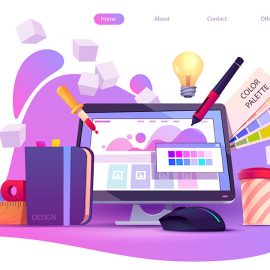
7 Skills Every Web Designer Must Master
Web design is as much a science as it is an art form. While half of the job is based on sound coding and design know-how, the other half is based on just having an intuitive sense of what looks good and what doesn’t. Any web designer worth his salt will develop a strong core of fundamentals to make himself stand out from the rest of the pack.
So how do you develop these fundamentals? They won’t just appear overnight. Sure, there is no substitute for experience, but a strong education — whether formal or not — also helps tremendously.
It’s also highly advisable to keep challenging yourself and push beyond the limits of your comfort zone. That will mean the difference between struggling to find and keep clients and actually having clients come find you.
Here are the absolute fundamentals that all good web designers should possess if they want to reach sublime levels. They don’t all involve technical, computer know-how.
1. Be familiar with the entire design process
Web design can also overlap with graphic design, which makes these schools of design very close. That’s why it’s a smart idea for any web designer with pride in his work to also learn at least the very basics of the design process in general. This includes the following principles:
Colour
Colour is at the heart of web design because it helps to establish the theme and motif of any effective design. In addition, it also works on the psychological, where colours influence how a website visitor views his user experience.Flow
Flow is a reference to a website visitor’s visual movement as he experiences the website. Flow includes the proper use of depth, colour, hierarchy, shapes and lines. Flow tools include perspective, spacing and facial direction.Balance and proportion
This means visual stability and equilibrium. It’s possible to get proportion in two ways: symmetrically and asymmetrically. Proportion’s normally used to signify important elements, thereby bettering the flow of information.Spacing
- Spacing is pretty much straightforward. It relates to the distance from one element to the other. All websites with a great user experience are well-spaced.
Generally, the space ought to be generous enough for the elements to breathe while still being narrow enough to ensure good readability. It’s a balancing act.
2. Know HTML like the back of your hand
Knowing HTML comes down to coding. Some designers seem to think that it’s okay not to know how to code, while others are adamant that knowing how to code is a necessity of being a legitimate web designer. At a bare minimum, a well-rounded designer should know the basics of HTML. At the very least!
Since HTML is the basic framework of all pages on the web, a designer should be knowledgeable about it. As a result, a designer will be able to design with more purpose and attention to usability than ever before.
If you know basic code, you can create demo sites that you’ve designed, you’re in a better position to sell your services than other designers who don’t know coding, and you’ll have a better grasp of the scope and limits of your design abilities.
3. Understand the finer points of creating killer copy
As a web designer, you’ll be asked to do more than design. You’ll sometimes also be asked to create website copy. This is especially true if you don’t work with any copywriters. Think of it this way. A designer who also has mad copywriting skills is that much more attractive to clients and can charge more.
Don’t think that knowing how to write effective copy is just something you can use when you’re designing clients’ websites.
Knowing how to write effective copy is an unbeatable asset when it comes to marketing your services as a designer in the first place. Just think of how much more effective your marketing emails will be when you learn how to craft stellar copy.
4. Commit to constant learning
The phrase “There’s always better” is what you should live by as a web designer. You can always learn new things that will impress your clients, expand your creativity and skills and generally improve your passion for design.
One big reason to always be open to learning more is the fact that new trends are always emerging in web design.
In design, learning is ongoing. You never stop learning, so you can always be on top of the latest trends, which just makes you nicely well-rounded as a designer.
5. Develop some business skills
A lot of web designers work freelance at one point or another in their careers. So it only stands to reason that you should develop those all-important business skills.
You are your own business and the highly-prized service you are selling is your web-design talent. Without business skills, you’ll be floundering in the all-important areas of marketing yourself, finding clients, maintaining clients and doing all this productively.
If you know how to run a business, you’ll be able to make decisions related to taking on clients and projects with much more certainty than ever.
You’ll also learn about the multitasking skills it takes to juggle being a creative designer with the practical talent it takes to make money and keep making more of it as you grow in your career.
6. Master the art of great listening
Since you work with clients based on what they tell you they want for their website needs, it only stands to reason that you have to become a master listener. Being able to listen well is a life skill that you can use across so many different areas, so why not master it as a web designer?
You’ll never be a successful designer — in the business sense — if you either fail to listen to your clients or refuse to listen to them. Your clients will always be asking or telling you to tweak and change designs, sometimes midway through.
Instead of getting frustrated and coming across as unprofessional, which will hurt your business, learn to listen to what they want, consider it and then offer your own input and suggestions. If what the client wants is very doable, then all the better. Simply implement it and show how attentive you are to your client’s needs.
7. Reach your web design zenith
In any trade, reaching the heights of your profession is what you should be aiming for. It will not come overnight or even in a year or two, but you’ll eventually get there with constant determination and self-improvement.
If you’re highly passionate about your craft, you’ll automatically drift to this state of being anyway, but you can do things to speed up this process.
Essentially, it’s all about a web designer becoming well-rounded and consummate. The more you work on things that go beyond merely just design, the more you become a much, much better web designer. And that’s when you start to penetrate through to master status.
SOURCE: Webdesigner Depot



